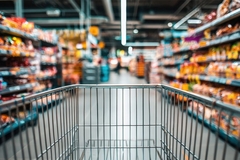
- Industry news
Industry news
- Category news
Category news
- Reports
- Key trends
- Multimedia
- Journal
- Events
- Suppliers
- Home
- Industry news
Industry news
- Category news
Category news
- Reports
- Key trends
- Multimedia
- Events
- Suppliers
Elliott Report: UK Urgently Needs to Tackle Food Crime

05 Sep 2014 --- The Elliott review on food authenticity, which was published yesterday, has made a number of recommendations to the UK Government including an urgent need to tackle food crime. The report, by Professor Chris Elliott of Queen’s University Belfast in Northern Ireland and director of the Institute of Global Food Security, reached a number of key conclusions aimed at tackling food fraud, including the need to improve auditing in the food industry.
Elliott, who was appointed by the Government to investigate the issue of food authenticity and fraud following the horsemeat scandal, based his conclusions on the ‘eight pillars of integrity’ (which are: ‘consumer first’, ‘zero tolerance’, ‘intelligence gathering’, ‘laboratory services’, ‘government support’, ‘leadership’ and ‘crisis management’), which he used to approach the study.

Tackling food crime is one of the key messages highlighted in the report. “A Food Crime Unit is urgently needed to protect our food industry and consumers from criminal activity, but it will repay investment by protecting the majority of businesses who work hard to provide safe and authentic food for UK consumers,” Elliott said. “Establishing better links with food crime agencies across the EU and beyond will help combat international criminal activity in food supply.”
A unit of this kind will be set up in the Food Standards Agency (FSA) according to the Government, which will aim to give a better focus on enforcement against food fraud. As a response to the report, the Government has also stated it will improve intelligence-sharing.
Also on the subject of food crime, Elliott stated: “Food fraud may be costing UK food businesses a substantial amount of money and risks causing significant reputational damage. Importantly, some of the examples uncovered pose food safety risks. However, due to factors such as a lack of intelligence-based detection, the scale of the problem remains unknown.”
Environment secretary Elizabeth Truss stated that when a shopper picks something up from a supermarket shelf, “it should be exactly what it says on the label, and we’ll crack down on food fraudsters trying to con British consumers.”
“As well as keeping up confidence here, we need to protect the great reputation of our food abroad,” she continued. “We’ve been opening up even more export markets, which will grow our economy, provide jobs, and support the government’s long-term economic plan.”
Elliott concluded that he believed the report would be beneficial to the UK in the long-term in support of the nation’s ongoing work in tackling food crime. “We are in a much, much better position already than we were in January 2013, but there is still a lot of work to be done,” he stated. “This needs to remain a long-term focus for industry and government.”
All of the recommendations in the Elliott report on food integrity and assurance of food supply networks have been accepted by the government, UK Environment Secretary Elizabeth Truss announced.
This includes the establishment of a new Food Crime Unit, which the Environment Secretary said would strengthen consumer confidence in Britain’s high quality food.
British food has a world renowned reputation and the government wants to strengthen this to ensure families have confidence in the food that they buy. Shoppers should be able to understand where their food comes from and be protected from food fraudsters.
The new Food Crime Unit is one of a number of improvements the government is taking to ensure consumers have absolute confidence in the produce they purchase.
Professor Elliott’s review examines ways to prevent food fraud incidents from happening. It also looked into how to improve the culture of our food supply chain to support industry taking effective responsibility for the traceability of their products, support local authorities target enforcement activity based on risk and ensure consumers have an increased understanding of where their food comes from.
Speaking as the government published its full response to Professor Elliott’s report, Environment Secretary Elizabeth Truss said:
“We’re taking action to make sure that families can have absolute confidence in the food that they buy. When a shopper picks something up from a supermarket shelf it should be exactly what it says on the label, and we’ll crack down on food fraudsters trying to con British consumers.
“As well as keeping up confidence here, we need to protect the great reputation of our food abroad. We’ve been opening up even more export markets, which will grow our economy, provide jobs, and support the government’s long-term economic plan.
“The action we’re taking gives more power to consumers - meaning they’ve got better labelling on food, better education about where their food comes from, and better, locally-sourced food in schools and hospitals.”
The horsemeat fraud incident highlighted the importance of having transparency about the source of food products. Consumers made clear that they wanted assurance that what they are buying is what it says it is. Immediately after the incident consumers increasingly chose British food, with an increase of 10% in British beef on sale in UK retailers.
The government has taken further action to make sure consumers know where their food is coming from and ensure consumer confidence through:
•improved labelling including new country of origin labelling introduced from April 2015.
•making it easier for food procurers to make decisions about the locality, authenticity and traceability of their food.
The government has also taken action to empower consumers to understand where their food comes from through:
•improving public procurement of food and catering services to provide schools and hospitals with high quality British food and boost UK farming.
•improving food education in schools through a new national curriculum to give children a better understanding of where their food comes from and why it is important to know what is in our food.
Food and drink is our largest manufacturing industry and the integrity of the food supply chains is important for the credibility of our exports, our domestic economy and consumers. The government and industry have taken action to improve our reputation through:
•expanding trade internationally through the Export Action Plan, opening up new markets in China and the US and increasing exports of UK food and drink by 6.8% since 2010.
•robust testing of meat by industry and government with over 50,000 tests carried out - all of them showing that horsemeat was not present.
Retailers welcomed the Elliott Review into the integrity and assurance of food supply networks. Andrew Opie, Director, Food and Sustainability at the British Retail Consortium (BRC) said: "The Elliott report makes a valuable contribution to strengthening supply chain controls – a fundamental issue for all retailers. We particularly welcome the recognition that this requires good co-ordination along the supply chain and with Governments here and in Europe and that all parties must accept and meet their responsibilities.”
"The retail sector has played its part by carrying out an extensive review of how we exchange intelligence, how we can tighten up testing and auditing and shorten our supply chains. The BRC itself has developed new key tools for auditing the supply chain that will strengthen controls and directly target food fraud."
by Sonya Hook










